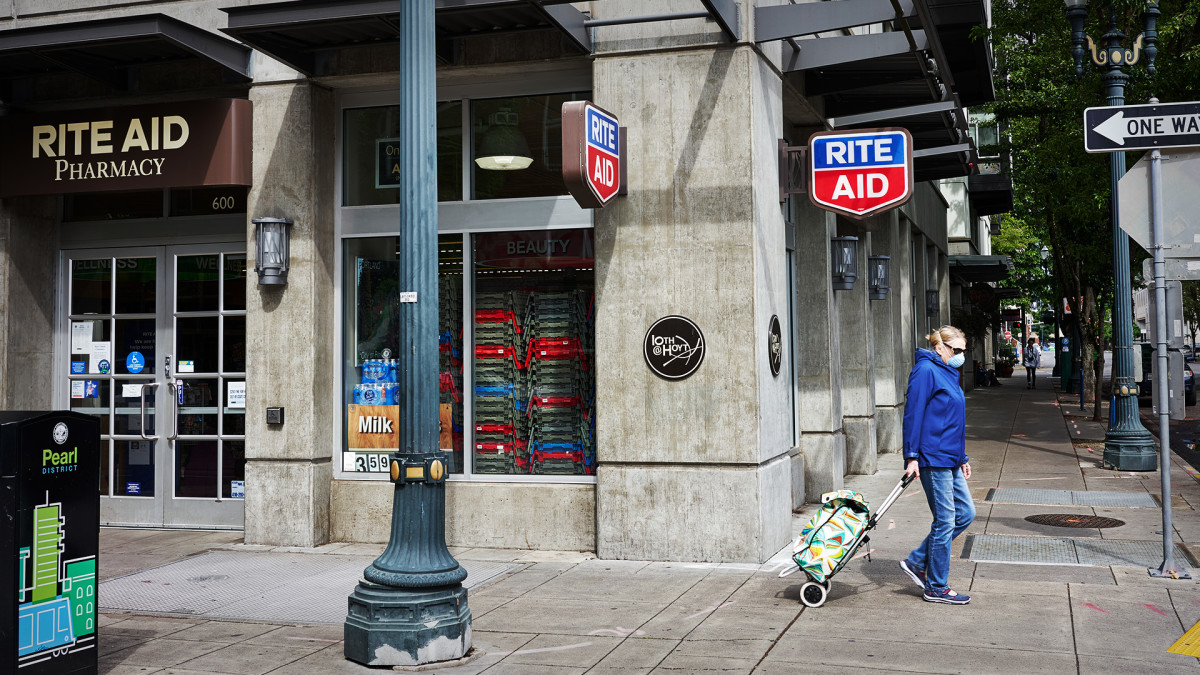
Retail theft has significantly cut into retailers' revenue and profits in recent years, forcing many companies to take steps to prevent inventory losses. Technology plays a large role in theft prevention with artificial intelligence, cameras and other technological devices used to stop the flow of stolen goods out the door.
Grocery chain Kroger (KR) -), which encourages its customers to use its self-checkout service, has implemented an artificial intelligence and camera system in its self-checkout lanes to help monitor improperly scanned items as well as theft.
Related: You won't like what Walmart, Amazon, and Kroger are doing
Walmart (WMT) -) has installed cameras at each self-checkout station for theft prevention. The employees who monitor the store's self-checkout area carry hand-held devices called TC Devices that monitors everything a person is buying, how much each item costs and how much the total purchase is to aid in preventing theft.
Rite Aid was going high tech with its loss prevention by using artificial intelligence-based facial recognition surveillance systems from 2012 to 2020, in order to identify customers who may have been engaged in shoplifting or other problematic behavior in its stores, according to a complaint filed in federal court by the Federal Trade Commission.
The complaint, however, charged that Rite Aid "failed to take reasonable measures to prevent harm to consumers, who, as a result, were erroneously accused by employees of wrongdoing because facial recognition technology falsely flagged the consumers as matching someone who had previously been identified as a shoplifter or other troublemaker."

Image source: Shutterstock
FTC seeks ban on Rite Aid using A.I. technology
The FTC on Dec. 19 filed for a stipulated order and permanent injunction in the U.S. District Court for the Eastern District of Pennsylvania banning Rite Aid from using facial recognition technology for surveillance purposes for five years to settle FTC charges that the retailer failed to implement reasonable procedures and prevent harm to consumers in its use of facial recognition technology in hundreds of stores.
The proposed order will require Rite Aid to implement comprehensive safeguards to prevent harm to consumers when deploying automated systems that use biometric information to track them or flag them as security risks. Rite Aid will also be required to discontinue using any such technology if it cannot control potential risks to consumers.
The drugstore chain will be required to implement a robust information security program, which must be overseen by the company’s top executives, to settle charges it violated a 2010 Commission data security order by failing to adequately oversee its service providers, .
Rite Aid’s procedures subjected consumers to embarrassment, harassment, and other harm, according to the complaint. The company did not inform consumers it was using the technology in its stores, and it discouraged employees from revealing such information, according to the complaint.
Employees, acting on false positive alerts, followed consumers around its stores, searched them, ordered them to leave, called the police to confront or remove consumers, and publicly accused them, sometimes in front of friends or family, of shoplifting or other wrongdoing, according to the complaint. The FTC said Rite Aid’s actions disproportionately impacted people of color.
Rite Aid had contract agreements with two companies to create a database of images of individuals — considered to be “persons of interest” because Rite Aid believed they engaged in or attempted to engage in criminal activity at one of its retail locations — along with their names and other information. The company collected tens of thousands of images of individuals, many of which were low-quality and came from Rite Aid’s security cameras, employee phone cameras and news stories, according to the complaint.
Courts must approve FTC ban order
The FTC voted 3-0 to authorize its staff to file the complaint and the proposed stipulated order against Rite Aid. Since Rite Aid is currently going through bankruptcy proceedings, the order will go into effect after approval from the bankruptcy court and the federal district court, as well as modification of the 2010 order by the Commission.
Rite Aid filed for Chapter 11 bankruptcy on Oct. 15 as the company has struggled for years against competitors CVS (CVS) -), Walgreens Boots Alliance (WBA) -) drug retailer Walgreens and other pharmaceutical providers for prescription business.
The company also faced a Department of Justice civil lawsuit filed against the company in March 2023 alleging that its pharmacists inappropriately filled opioid prescriptions, contributing to the opioid epidemic. The bankruptcy filing triggered an automatic stay of any further legal action in the lawsuit and allow the company to negotiate a less expensive settlement that could be over $1 billion without the bankruptcy filing.
Get exclusive access to portfolio managers’ stock picks and proven investing strategies with Real Money Pro. Get started now.







